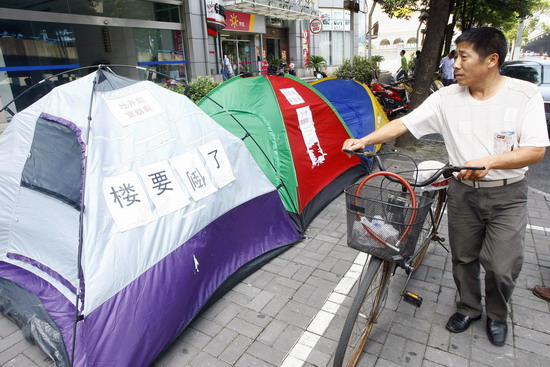Society
Fears of building collapse force residents into tents
By Wu Yiyao (China Daily)
Updated: 2010-08-09 07:21
 |
Large Medium Small |
|
|
SHANGHAI - Angry residents whose apartment buildings are sinking and cracking have set up tents in front of the Bothland Hotel Shanghai to protest the hotel's expansion construction.
Residents of Yihong Jingyuan, a residential development in Hongkou district, said their buildings' conditions are due to "brutal construction" of the neighboring hotel that began early this year, which includes an underground car park.
Shen and his neighbors had erected five tents by the street outside the two blocks that host 82 apartments. They have taken to living in the tents "because we are afraid the building may fall apart when we are sleeping".
They also put slogans saying "Sinking building harms harmony" to attract attention.
The hotel started its expansion work in January, the time "our nightmare began", Shen said. Residents found increasing cracks on the walls and widening gaps on the ground.
Window panes have also started to crack. By Aug 4, as many as eight apartments have had cracked window panes.
Residents have made several reports to the hotel and supervising departments and last month set up an online blog to record the progress of their protest.
"We spent our life savings on the apartment but we don't want to lose our lives in it," said Shen Jianchong, a resident who painted slogans saying "Protect our beautiful homes" on a broken wall next to the construction site.
He said his family spent 900,000 yuan on the apartment in 2005, which should cost 2 million yuan now. "But it is now worthless because no one would buy a broken apartment like this," he said.
A resident who spoke on condition of anonymity said the hotel had asked Shanghai Architectural and Engineering Consultants Co Ltd to conduct tests, which showed the apartment buildings are "safe" but did recommend repairs and reinforcement work to "prevent the cracks getting larger".
"The hotel only agreed to fill the cracks with cement - they just want to cover their tracks," the resident said.
The report also showed the sinking of the road and fence around the construction site did exceed warning limits, but the apartment buildings had sunk by only about 4.5 mm, which is under the 20mm danger limit.
The resident said some officials investigated the problem, but concluded the apartment buildings were not dangerous "for the time being."
"What if our building fell tomorrow? 'For the time being' doesn't mean anything," he said.
Hotel management could not be reached for comment.
Zhou Liping, a spokeswoman with Hongkou District Construction and Traffic Committee, said on Sunday that the committee is still investigating and will publish the result in two to three days.
"It's quite a technical task to decide whether the leaning building is dangerous, and it takes time to make plans," said Zhou.
On June 27 last year, a 13-story building in the Lotus Riverside residential complex, in suburban Minhang district, fell on its side, killing one worker who had finished work for the day but had returned to collect his tools.
Investigations revealed the building collapsed as its foundation was undermined by a combination of excavated soil piled 10m high on one side and the digging of a 4.6-m deep underground car park on the other.




